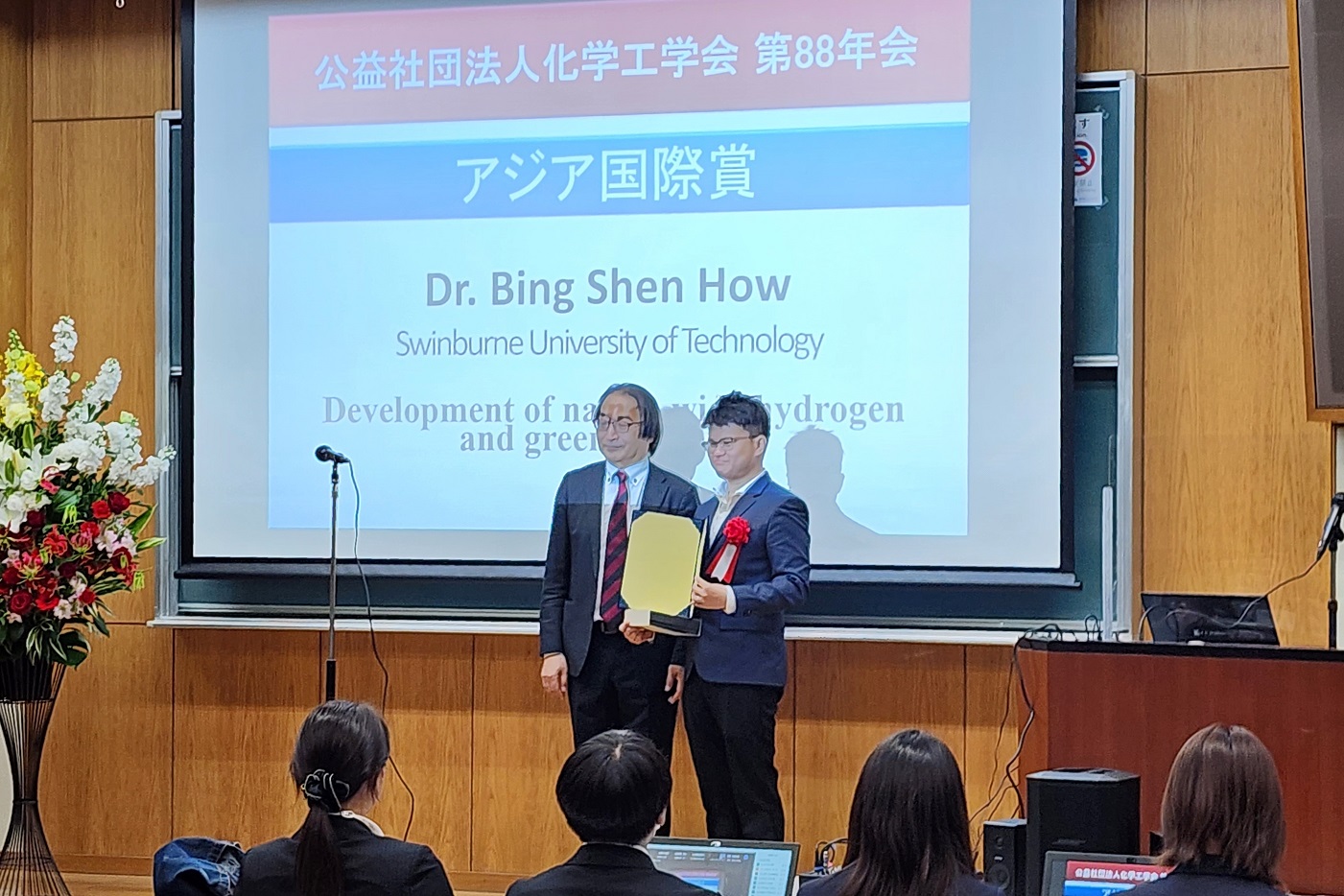Earlier this year Ir. Dr How Bing Shen, Chemical Engineering Discipline Leader and Senior Lecturer at Swinburne Sarawak, was accorded the Society of Chemical Engineers, Japan (SCEJ) Award for Outstanding Asian Researcher and Engineer in recognition of his outstanding achievements and contribution to the field of chemical engineering.
Every year, SCEJ grants the SCEJ Award for Outstanding Asian Researcher and Engineer to Asian researchers and engineers under the age of 45 who possess the exceptional vision, achievement and knowledge to inspire others to succeed and to contribute to the chemical engineering society and community.
As one of the four researchers to receive this honourable award, Dr How was awarded for his breakthrough work in biomass supply chain and circular economy. Through his research, he successfully developed an optimal circular economy model for the Oil & Gas (O&G) sector in Malaysia.
In his circular economy model, products and wastes are returned into the supply chain as reusable resources or used more efficiently and this model is able to achieve a 46.55% reduction in environmental impact while also increasing revenue. These impressive results would serve as an insight to policymakers in making effective national emission reduction plans for the O&G sector.
While receiving his award during the International Chemical Engineering Symposia (IChES) 2023 during mid-March, Dr How was also invited to deliver a keynote speech entitled ‘Exploring n-best solution space for a heat recovery problem using graph theoretic approach’. In his speech, he showcased proof-of-concept of his research approach to heat recovery problems, which involves a model that is able to yield both optimal and sub-optimal solutions simultaneously, as well as a few successful pedagogical and research applications.

Dr How receives the SCEJ Award for Outstanding Asian Researcher and Engineer from Professor Masahiko Matsukata, Vice President of SCEJ.
Dr How’s journey at Swinburne Sarawak began in 2019 when he first joined the Faculty of Engineering, Computing and Science as a lecturer. In the years since then, he has shown his calibre through the numerous research projects he has pursued. Most of his research projects centre around sustainable development, including the aforementioned research for the O&G sector, as well as another project under a Sarawak Research and Development Council grant where he is designing a system capable of capturing emitted carbon dioxide and turning it into usable building materials.
His breadth of research experience has also led to invitations to serve as a consultant for a number of independent projects in relation to carbon and methane emissions for the cement, palm oil and O&G industries.
At only 32 years old, Dr How has already received a dozen of awards at both the national and international level since joining Swinburne, with the most notable ones being the newly-awarded SCEJ Award, the IChemE Malaysia Award 2021 – Young Researcher Award and the IChemE Global Award 2021 – Young Researcher Award.
In the classroom, he brings his research expertise to the Chemical Engineering students by teaching the tool which he has developed in his heat recovery problem research (which they have termed as P-HENS), making Swinburne Sarawak one of the pioneering institutions to introduce such a novel tool to undergraduate students. This has resulted in positive outcomes, with Swinburne Sarawak students winning the IChemE POPSIG Best Final Year Design Award 2022 and clinching the champion spot at the Plant Design Competition at the National Chemical Engineering Symposium (NACES) 2022.
Amidst his various research and teaching work, he also finds time to supervise postgraduate students – he is currently serving as principal supervisor for 2 PhD students and 1 Masters student, as well co-supervisor for 3 PhD students.
Prospective higher-degree research candidates are highly welcome to enquire about research opportunities with Dr How in the area of Data-Driven Process System Engineering (Design, Modelling and Optimisation). Research candidates and industry partners keen to connect with Dr How may email him at bshow@swinburne.edu.my.


